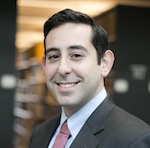EEOC v. Abercrombie & Fitch Stores, Inc.
 The recent decision in EEOC v. Abercrombie was only surprising because it took so long.
The recent decision in EEOC v. Abercrombie was only surprising because it took so long.
The facts of the case are simple: Samantha Elauf is a practicing Muslim woman who wears a headscarf in accordance with her religious beliefs. She applied for a job at Abercrombie, which had a strict employee dress code that included no “caps.” The assistant manager who interviewed Elauf informed her superior that she believed Elauf’s head covering was religious, and asked if it would still be forbidden. The district manager responded that all headgear, religious or otherwise, would violate the policy. He instructed her not to hire Elauf because of the headgear Elauf had to wear.
Title VII of the Civil Rights Act of 1964 states that it is unlawful for an employer to refuse to hire an applicant because of the applicant’s religious practice if said practice could be accommodated without undue hardship. In plain English, Abercrombie violated Title VII when it decided not to hire Elauf because of her religious headwear instead of offering to give her an accommodation. Abercrombie’s argument, that they could not be sued because technically they had never confirmed the fact that the headwear was indeed religious, was almost silly. Motive, not knowledge, is what counts for Title VII, and the motive here, a desire to avoid a prospective religious accommodation, was clear. As Justice Scalia told the crowd when he announced the decision from the bench, “This is really easy.” The argument that there was no discrimination because this was just a neutral no caps policy that applies to everyone did not pass muster; not all caps are the same, and some caps need to be accommodated.
The facts in this case were so clear that they may have made the next case harder. Justice Alito, who concurred with the majority’s decision, implicitly made this point when he wrote that “an employer cannot be held liable for taking an adverse action because of an employee’s religious practice unless the employer knows that the employee engages in the practice for a religious reason,” but that “there was ample evidence in the summary judgment record to prove that Abercrombie knew.” The majority, however, refused to address this question, noting in a footnote that:
While a knowledge requirement cannot be added to the motive requirement, it is arguable that the motive requirement itself is not met unless the employer at least suspects that the practice in question is a religious practice—i.e., that he cannot discriminate “because of” a “religious practice” unless he knows or suspects it to be a religious practice. That issue is not presented in this case, since Abercrombie knew—or at least suspected—that the scarf was worn for religious reasons. The question has therefore not been discussed by either side, in brief or oral argument. It seems to us inappropriate to resolve this unargued point by way of dictum, as the concurrence would do.
And so what where exactly does this decision leave potential employers when the religious accommodation needed is not as common, or as obvious, as headgear? The law, for example, distinguishes between choices that are “philosophical and personal” as opposed to religious. As the 10th Circuit noted, the EEOC’s Compliance Manual gives the following illustration:
Sylvia wears several tattoos and has recently had her nose and eyebrows pierced. A newly hired manager implements a dress code that requires that employees have no visible piercings or tattoos. Sylvia says that her tattoos and piercings are religious because they reflect her belief in body art as self-expression and should be accommodated. However, the evidence demonstrates that her tattoos and piercings are not related to any religious belief system. For example, they do not function as a symbol of any religious belief, and do not relate to any “ultimate concerns” such as life, purpose, death, humanity’s place in the universe, or right and wrong, and they are not part of a moral or ethical belief system. Therefore, her belief is a personal preference that is not religious in nature. EEOC Compliance Manual § 12-I(A)(1), Ex. 6.
In addition, as per the EEOC’s guidelines,
Questions about an applicant's religious affiliation or beliefs (unless the religion is a bona fide occupational qualification, are generally viewed as non job-related and problematic under federal law.
How then are employers supposed to draw the fine lines between asking potentially problematic questions about the nature and extent of religious beliefs and practices, while at the same time making sure to meet their burden of offering reasonable accommodations?
The simple answer seems to be to shift the burden back to the potential hire. Employers might ask the interviewee to read through all of their policies in advance of the initial meeting, and then ask if there was anything in the material that might be an issue, or might require any kind of accommodation. That way, the private and special nature of religion is both respected and affirmed.